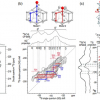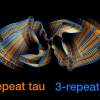Research published in Brain could provide new ways to assess the effectiveness of treatments currently in development for motor neuron disease (MND). Researchers used 31P magnetic resonance spectroscopy to measure chemicals that are crucial to energy metabolism in the cell. The research was conducted on patients living with MND as well as age and gender matched healthy controls. The patient perceives the procedure as a standard MRI scan but researchers are able to gain a direct measurement of chemicals so that they can calculate a comprehensive picture of the energy status in patients with MND.
MND, or amyotrophic lateral sclerosis (ALS), as it is also known, is a disorder that affects the motor neurons in the brain and spinal cord that form the connection between the nervous system and muscles to enable movement of the body. The messages from these nerves gradually stop reaching the muscles, leading them to weaken, stiffen and waste. There are many barriers to developing effective treatments for MND as we don’t yet fully understand how or why it develops in the first place. However, there is good evidence from laboratory data and disease models that the mitochondria of the cell may be impaired.
Lead author on the study, Dr Matilde Sassani from the University of Sheffield, explains: “It is important to have an effective technique to measure mitochondrial function in vivo in patients living with MND. In this study we found that phosphocreatine levels were depleted in the brain compared to healthy controls and, in the muscle, we found that inorganic phosphates were elevated in patients with MND. Both of these findings are consistent with mitochondrial dysfunction occurring in these people living with MND.”
Dr Thomas Jenkins, senior author of the paper and Clinical Senior Lecturer at SITraN, said: “This research has the potential to impact the development of more effective treatments for MND. It appears to be a promising tool with potential to measure the effect of medications acting on mitochondrial function in people living with MND. Treatments that aim to rescue mitochondrial function in MND are being investigated in labs around the world. This non-invasive tool can demonstrate whether medications in development are successfully targeting mitochondria, which is an important step in selecting treatments to take through to clinical trials.”
Future research aims to widen the scope of this study to include larger numbers of MND patients. As the mitochondria are also thought to be a factor in a range of other neurodegenerative diseases, there may be potential for this technique to be widened to different patient groups.







